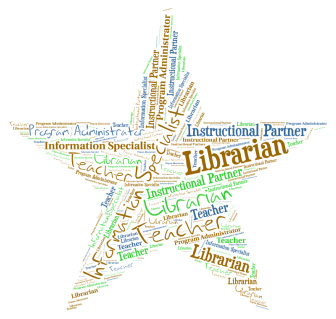4.3 Leadership
Utilizing evidence-based practice and information from education and library research, candidates communicate ways in which the library program can enhance school improvement efforts.
2010 ALA/AASL Standards for Initial Preparation of School Librarians
|
“You have to decide what your highest priorities are and have the courage—pleasantly, smilingly, nonapologetically, to say “no” to other things. And the way you do that is by having a bigger “yes” burning inside. The enemy of the “best” is often the “good.” ― Stephen R. Covey
|

In a career defined by “four roles,” in a place known as the hub of the school, there will always be a task to accomplish. How do you decide what is important? Important for this minute, important for this child, important for this school year? In the course, Administration and Leadership, I studied, discussed, and reflected on evaluation tools for assessing both school library media specialists and school library media programs. We read and compared rubrics from the American Association of School Librarians (AASL), from the Maryland State Department of Education, and from local school districts. I then met with a practicing school library media specialist and discussed portions of two of the tools published by the AASL: School Library Program Assessment Rubric for a Planning Guide for Empowering Learners and Learning 4 Life Sample School Librarian Performance and Evaluation System. We discussed how she and her media center program aligned to the rubrics. Afterwards, I wrote an analysis of the evaluation tools, the library, and the media specialist. I developed goals and objectives for the media specialist and her program. I then reviewed my own professional development plan and developed goals and objectives for myself based on these evaluation tools.
The tools published by the AASL were very comprehensive and even overwhelming at first. Reviewing portions of them with the practicing media specialist was vital to my understanding of the tool and the measurement standards. She helped me to see that running a media center is a process – a journey, not a destination. I now understand that the job is not about “achieving the end goal,” but rather is a cycle of setting goals, reflecting on the progress, and developing new goals, especially as new technologies emerge in education and in information literacy. Strategic planning and prioritization are vital to the effectiveness of the school library media center and the school library media specialist. Evaluation tools, both those created by local districts and those created by national organizations, can assist the school library media specialist in setting goals for his or herself and his or her center. The focus of this media specialist on both emerging technologies and the new curriculum being implemented around the Common Core demonstrates how a media specialist and media center continually need to evolve.
After completing this analysis of national tools, I want to use my local state evaluation tool, Standards for School Library Media Programs In Maryland, and my local district’s evaluation tool for school library media specialists to develop a strategic plan for my program and myself. Prior to completing this assignment, I would not have thought to use evaluation tools for planning purposes, but it makes complete sense. In planning for student instruction, you first consider what you want the student to know and be able to do by the end of the learning process. In strategic planning, you should also consider what you want to know and be able to do by the end of your growth process. Evaluation of the strategic plan leads to an ability of the school library media specialist to communicate ways in which the library program can enhance school improvement efforts.
After completing this analysis of national tools, I want to use my local state evaluation tool, Standards for School Library Media Programs In Maryland, and my local district’s evaluation tool for school library media specialists to develop a strategic plan for my program and myself. Prior to completing this assignment, I would not have thought to use evaluation tools for planning purposes, but it makes complete sense. In planning for student instruction, you first consider what you want the student to know and be able to do by the end of the learning process. In strategic planning, you should also consider what you want to know and be able to do by the end of your growth process. Evaluation of the strategic plan leads to an ability of the school library media specialist to communicate ways in which the library program can enhance school improvement efforts.

This portfolio and the artifacts contained herein by Amy Soldavini are licensed under a Creative Commons Attribution-NonCommercial-ShareAlike 3.0 Unported License |
Revised July 2013
